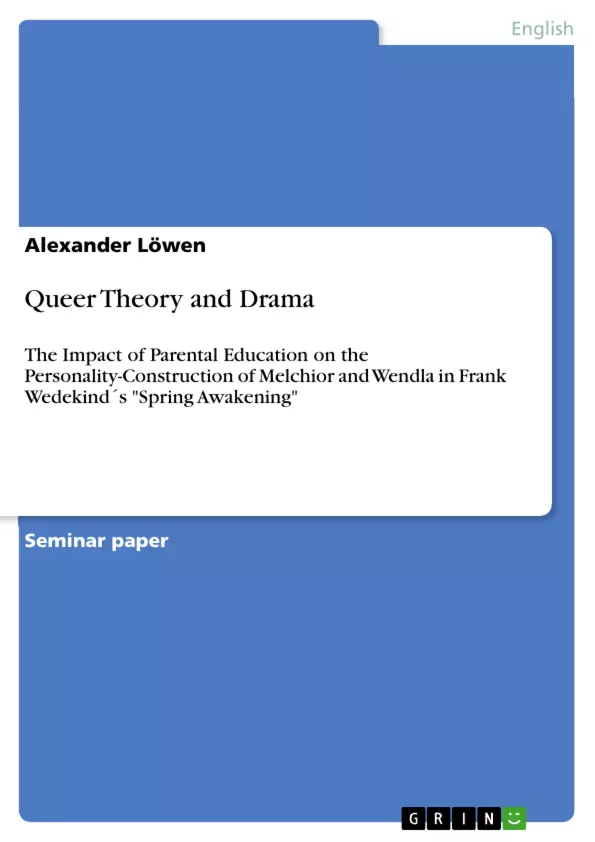Frank Wedekind´s "Spring Awakening" was undoubtedly a real shocker for its time. Still today every director and actor ask themselves how to approach this extraordinary piece of drama.
This paper examines from a queer and psychoanalytic perspectve the personality construction of the two major characters Melchior and Wendla and comes to a serious conclusion which is of interdisciplinary importance.
Inhaltsverzeichnis (Table of Contents)
- I. Introduction
- II. Sexual Oppression in Spring Awakening
- 1. The Term
- 2. The Role of the Mothers
- 3. The Role of the Fathers
- III. Conclusion
Zielsetzung und Themenschwerpunkte (Objectives and Key Themes)
This essay examines the impact of parental education on the personality development of Melchior and Wendla in Frank Wedekind's Spring Awakening. It explores the play's themes of sexual suppression and the contrasting desire for sex education, analyzing the characters' experiences within the context of "queer" theory.
- The influence of societal norms and parental upbringing on the characters' understanding of sexuality
- The impact of sexual suppression on the characters' personal development and identity formation
- The role of the mothers in shaping their children's views on sexuality and morality
- The contrast between the characters' desire for knowledge and the limitations imposed by societal expectations
- The use of "queer" theory to analyze the play's portrayal of sexuality and gender roles
Zusammenfassung der Kapitel (Chapter Summaries)
I. Introduction
The introduction establishes the context of the essay, highlighting Spring Awakening's significance as a piece of art that reflects the social and cultural landscape of late 19th and early 20th century Germany. The author discusses the play's themes of sexual suppression and the desire for sex education, setting the stage for an analysis through the lens of "queer" theory.
II. Sexual Oppression in Spring Awakening
1. The Term
This section defines sexuality and explores the historical context of sexual oppression, focusing on Michel Foucault's Repressive Hypothesis. The author argues that the prohibition of sexuality actually leads to greater discourse and interest in the topic.
2. The Role of the Mothers
This section analyzes the mothers' role in shaping their children's understanding of sexuality. It examines the character of Frau Bergmann and her restrictive approach to Wendla's sexual curiosity, highlighting the generational transmission of shame and the impact of societal expectations on female characters in the play.
Frequently Asked Questions
What is the central theme of Frank Wedekind's "Spring Awakening"?
The play explores themes of sexual suppression, the lack of sex education, and the resulting conflict between adolescents and their parents in late 19th-century Germany.
How does parental upbringing affect Melchior and Wendla?
The essay argues that parental education, or the lack thereof, leads to sexual oppression and shame, which ultimately shapes the characters' tragic identities and fates.
What is Michel Foucault’s "Repressive Hypothesis" in this context?
It suggests that the societal prohibition of sexuality does not silence it but actually increases discourse and fascination with the topic, which is evident in the characters' curiosity.
What role do mothers play in the play according to the essay?
Mothers like Frau Bergmann are seen as agents of societal norms, transmitting shame and restricting their children's sexual curiosity due to generational expectations.
Why is "queer theory" used to analyze this drama?
Queer theory helps to deconstruct the rigid gender roles and societal norms portrayed in the play, highlighting the tension between natural desire and cultural restriction.
- Arbeit zitieren
- Alexander Löwen (Autor:in), 2013, Queer Theory and Drama, München, GRIN Verlag, https://www.grin.com/document/231087



